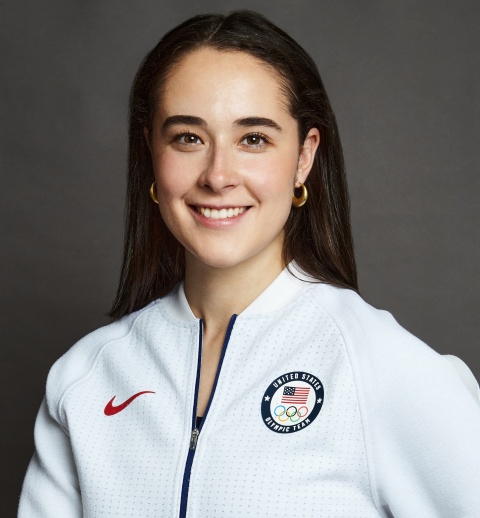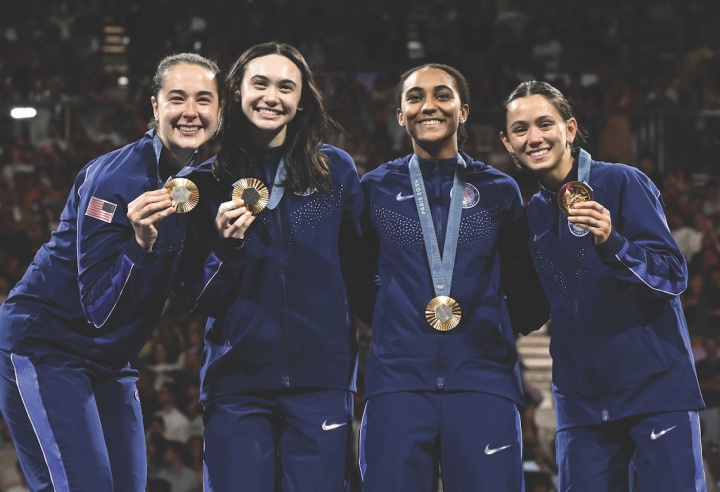CCT asks the standout fencer how it feels to reach the pinnacle of her sport.
Columbia College | Columbia University in the City of New York
CCT asks the standout fencer how it feels to reach the pinnacle of her sport.

Dubrovich (right) scores against her Italian opponent in the gold medal-winning match.
COURTESY JACKIE DUBROVICH ’16
On a Thursday afternoon in Paris, fencer Jackie Dubrovich ’16 made history. Twice.
The Columbia superstar helped the United States secure its first-ever Olympic gold medal in a fencing team competition on Aug. 1, defeating the top-seeded Italian women’s foil squad 45–39 with teammates Maia Mei Weintraub, Lauren Scruggs and Lee Kiefer.
She also became the first Columbia fencer to take home a gold. Dubrovich, a native of Maplewood, N.J., started fencing at 8 years old and quickly found her groove. By high school, she was ranked third in women’s foil in USA Juniors; Columbia’s historic fencing program was a major draw. “Columbia was always my first choice,” she says. “There was not even consideration for other colleges.”

COURTESY JACKIE DUBROVICH ’16
The thrill of victory does come with a tinge of the bittersweet — after competing in the 2020 Tokyo Olympics, Dubrovich had already decided that the Paris games would be her last. She spoke with CCT by phone in early September about her team’s exciting triumph, the mental aspect of competition and her plans for retirement.
Thank you so much! It was just an unbelievable experience. When people ask about it, I always reference the podium photos of me — I’m just like, ugly crying hysterically. I was so overwhelmed by emotion. I think we knew that we could do it as a team, but to actually do it on the biggest stage, against a very difficult Italian team? It was relief, it was excitement, it was shock, it was all these amazing feelings in one.
And this time around I was able to have my family there, as well as my fiancé, Brian Kaneshige, and my future sister-in-law and her family, and some friends. Brian has been coaching me since he transitioned from being a competitive athlete himself, so he was actually in the box with us during the team event. It was really cool to share the experience with him.

Good as gold! The winning women’s foil team, left to right: Dubrovich, Maia Mei Weintraub, Lauren Scruggs and Lee Kiefer.
USA FENCING BY #BIZZITEAM
And I think that being able to bounce back — despite her starting off really strong, not letting the crowd affect me, not letting the gravity of the moment affect me — and just, come back? I was really proud of myself for that.
The mental side of the game is so important, and after Tokyo I started to take it seriously. It’s not something that I had previously incorporated into my training routine but I think it’s a very underrated, very necessary part of being an athlete.
When you reach a certain level, you know your opponents really well because you’ve spent your whole life fencing against them. And maybe other people are marginally better at doing something than you, but everyone’s pretty much on the same playing field. So really, the difference comes down to your mental game, and how strong and focused you are and how you’re able to bounce back when you get hit several times. Are you going to crumble with the pressure, or are you going to fight back? That was the part that needed the most improvement for me.
Yes. Ever since I graduated, I’d balanced a full-time career in the ad tech industry with training and competing. I had a client-facing role that required a lot of energy, and as a perfectionist, I was trying to simultaneously give 100 percent to both my professional endeavors and my athletic goals. It was really difficult.
Typically, there are four years in between the Summer Olympics, but because of Covid-19, after Tokyo it was three. And so I really needed to make a decision. I knew that Paris was going to be my last Olympics, and I wanted to give myself the best chance possible to succeed. Never in my life have I had an opportunity to just train — it was always either balancing school and collegiate fencing with my national team pursuits, or the Olympics with a full-time job. And I knew I wanted to work on all of the things I had not been able to prioritize because I didn’t have the time — the sessions with a sports psychologist, more time for strength and conditioning, more time for rest and recovery. And so I took off a year and a half to prepare, and I think it was the best thing for me. I have no regrets. Now I can look back and think that was a pretty wise decision to make.
“It is really a privilege to be able to leave a sport on your own terms.”
But I really enjoyed working in ad tech; I did account strategy, which was like an intersection of consulting, analytics and advertising. It’s something I would explore going back to, once I start thinking about my real life and corporate career again.
It’s hard to put into words, because as an athlete, everything that you do in your life is structured around this one pursuit: to give yourself the best chance possible to get that gold medal at the Olympics. Especially for fencing — that is the pinnacle of our sport. And so for me to come back with a gold medal is very, very meaningful. It’s a culmination of 22 years of sacrifice and hard work.
And you know, at its core, fencing is a very individual sport — it’s just you versus your opponent. When I got to the College, it was my first taste of what team fencing was like. Most fencers never fence in a team environment until they get to collegiate fencing, so to go from being so individualistic to fighting for others and for the greater good of the team, you have to adjust your thinking. It’s a unique sport in that way. And so I always credit Columbia for being the first place I learned what it meant to fence for other people. I was a two-time captain as well, and that really sharpened my abilities to be supportive of others.
So when I think about how well we functioned as a team in Paris — I don’t know how to even describe it, everything was just working perfectly. It was like time stood still and we were all just doing what we had to do. It was like a symphony. It makes me think about my time at Columbia and how that prepared me to excel on the international stage and in team events.
I don’t think I’ve fully internalized it yet. I do feel very content with the decision, and I also think there will be a lot of sadness that comes with it. I think once I see people starting to train and travel to competitions again, that’s when it will really hit that I’m no longer part of that world. But it’s just — when it’s time, you feel it in your soul. I knew that I was going to give it my absolute all and that I was going to have to live with whatever happened, like if we didn’t win, if we didn’t medal at all.
Exactly, that really resonates with me. You hear all the time about people who get injured or the new generation pushes them out. It is really a privilege to be able to leave a sport on your own terms. And then to also leave with a gold medal — very few people get that opportunity. So I know I’m very lucky.
But fencing will always play a role in my life; so many amazing things have come from my participation in it. It gave me the opportunity to be recruited for Columbia, I met so many friends and my fiancé, I’ve traveled the world. And so I really want to give back to the community and teach; Brian and I are opening our own fencing club in New Jersey. That was something we really wanted to do together. We’re hoping to open this October, and I will mainly be working with little kids. The swords are taller than they are, it’s so cute! And I feel very passionately about teaching young girls; I think it can do wonders for them in terms of self-esteem and confidence.
It’s really shaped who I am as a human. I think sports can teach you a lot about life. I started when I was 8, so it’s 22 years of growth and development through the framework of a sport. I’ve encountered a lot of obstacles, and it has shaped me to be a strong, resilient, driven person. I learned I could work really hard at something, and I could succeed, and I could beat other people.
Because in the beginning, I wasn’t the person that loved fencing — I just loved being competitive! Of course as I’ve gotten older, it’s become a lot more nuanced. I love the sport for what it is and how unique it is, how dynamic, how physical and mental it is. But as a young girl, I really just loved to win, I loved collecting shiny medals — and that gave me the confidence that I’ve since carried into adulthood. So I definitely think sports can be really transformative. It can change the trajectory of your life.
But when I think about the kids we’ll be working with at our fencing club, it’s not about expectation. Not everybody is going to make a national team. Not everybody is going to go to the Olympics. But there’s so much more to the journey, about striving toward a goal and trying to be the best that you can be. That’s the most important thing.

Published three times a year by Columbia College for alumni, students, faculty, parents and friends.
Columbia Alumni Center
622 W. 113th St., MC 4530, 6th Fl.
New York, NY 10025
212-851-7852
cct@columbia.edu

Columbia Alumni Center
622 W. 113th St., MC 4530, 4th Fl.
New York, NY 10025
212-851-7488
ccalumni@columbia.edu